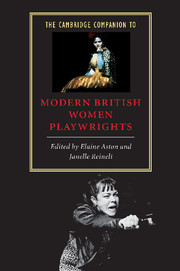Book contents
- Frontmatter
- 1 A century in view: from suffrage to the 1990s
- Part I Retrospectives
- Part II National tensions and intersections
- Editors’ note
- 5 The politics of location
- 6 Contemporary Welsh women playwrights
- 7 Contemporary Scottish women playwrights
- 8 Women playwrights in Northern Ireland
- 9 Language and identity in Timberlake Wertenbaker’s plays
- Part III The question of the canon
- Part IV The subject of identity
- Index
6 - Contemporary Welsh women playwrights
from Part II - National tensions and intersections
Published online by Cambridge University Press: 28 May 2006
- Frontmatter
- 1 A century in view: from suffrage to the 1990s
- Part I Retrospectives
- Part II National tensions and intersections
- Editors’ note
- 5 The politics of location
- 6 Contemporary Welsh women playwrights
- 7 Contemporary Scottish women playwrights
- 8 Women playwrights in Northern Ireland
- 9 Language and identity in Timberlake Wertenbaker’s plays
- Part III The question of the canon
- Part IV The subject of identity
- Index
Summary
Women and drama: the Welsh context
It is no exaggeration to state that women have been 'hidden' from historical, cultural, and literary production in Wales. It is also not an overstatement to maintain that Welsh cultural experience in Britain has tended to be strait-jacketed into a small repertoire of imaginative possibilities. These possibilities usually foreground masculine activity - male-voice choirs, rugby playing, mining, bardic proclamations, chapel ministry, and political radicalism. Although there is no denying that these behaviours existed (and are still resonant in Welsh cultural life), recent academic work in the social sciences and humanities in Wales has attempted to illuminate our clouded female past and to indicate new ways of representing 'Welshness'.
In Welsh historical studies, with their strong tradition of local and labour history, there has been a flourishing of work on women’s lives, often supported by community publishing ventures. This interest in female experience, centred in particular on women’s work and domesticity, was prompted in part by women’s increased visibility in the public sphere, as shown, for example, in the miners' support groups during the strikes of the mid-1980s, and the establishment of agencies to promote women’s presence in the workforce, such as Chwarae Teg (Fair Play) founded in 1992. From the late 1950s onwards, changes in the Welsh economy - specifically a gradual and eventually seismic shift away from the heavy industries of coal, steel, and slate to service and light industries - have served to make women more prominent in public life.
- Type
- Chapter
- Information
- Publisher: Cambridge University PressPrint publication year: 2000



